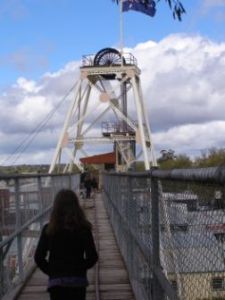Bendigo welcomed us with open arms.
“We haven’t had rain like this in three years. Stay longer!” they begged.
“No, no, Bendigo,” we chided. “You mustn’t be selfish. We only have one day to spend here. We are on a tight schedule and must take our rain-making circus to Ballarat post-haste. You wouldn’t want to deny Ballarat its rain, would you?”
Bendigo conceded, rather sulkily, that we had a point, so we threw ourselves into enjoying the day. And what a full day it was!
We spent a couple of (dry) hours underground, enjoying a fine tour of the Central Deborah Gold Mine. I highly recommend it if you are ever in Bendigo. Four of us enjoyed it immensely and learned lots of interesting and amazing facts. The fifth member of our party spent most of his time sobbing. When will we ever learn about dark places?
We all had to wear miners’ hats with lamps on the front. Very cool, except they were powered by an extremely heavy battery you had to strap around your waist. I tried to pick Baby Duck up to comfort him at one point and found it almost impossible to get him off the ground. So the poor old Carnivore had to lump his extremely heavy, extremely miserable son around instead.
When we resurfaced we panned for gold (no luck) and climbed the poppet head (the big tower thing above the shaft with all the winches and pulleys and stuff – yeah, I’m good at this technical talk). Not sure why we did that, actually, since all of us are afraid of heights, and there were predictable results.
Then it was off on the historic Talking Tram for a tour of Bendigo’s wide streets full of lovely old buildings, trees and gardens. It’s a really pretty city. Probably even more so when it’s not raining.
After lunch we visited the Discovery Museum, where there was a very interesting presentation at the planetarium. We were the only people there, so Demon Duck enjoyed showing off her knowledge (they’ve just been studying the planets at school). In brief gaps between the rain we saw the Chinese Gardens and temple and visited the Dragon Museum, which houses both the longest and the oldest Chinese dragons in Australia.

Then it was on to Ballarat. We stayed at the lodge attached to Sovereign Hill. Our accommodation had a queen-sized bed in the main room, with a double bunk on each side, plus two more double bunks in a separate bedroom. Very handy for all those families with eight children, I’m sure, but it seemed a bit of overkill on the beds to me! Plus they took up so much space there was nowhere really to put the small breakfast table (which only seated four – were the eight children supposed to eat in shifts?). When you wanted to use it you had to pull it out from the wall and block access to the bathroom. Very strange.
Sovereign Hill is a fascinating place. It’s a historically accurate gold-rush town, complete with goldfields, a mine and a river to pan for gold in. The main street has all the businesses such a town would have had, all working, plus schools, churches, soldiers’ quarters and government houses. There’s a working foundry, a wheelwright, clothes and sweet shops. People in costume are everywhere, going about their daily business.
More on that in another post. It was shut by the time we arrived, but they have an outdoor sound and light show there at night, which retells the story of the Eureka Stockade (an uprising by miners protesting the burden of miners’ licences, which ended in a brief battle with government soldiers in which several people were killed). We decided to brave the weather and got away with it. It didn’t rain, but we nearly froze our buns off. Man, it was cold! I had my warmest clothes on, plus a blanket from our room wrapped around me, and I was still cold.
Thankfully this time the dark was somehow not scary, and Baby Duck enjoyed the show, though all the ducklings were pretty pooped by the time we got back to our abundance of beds.
Holiday statistics for our second day in Victoria:
Rainfall: drought-breaking.
Other waterworks: one child reduced to sobbing wreck, others scared witless by extreme height.
Accommodation and food: average.
Are we having fun yet? yes, but we’re f-f-f-freezing.







